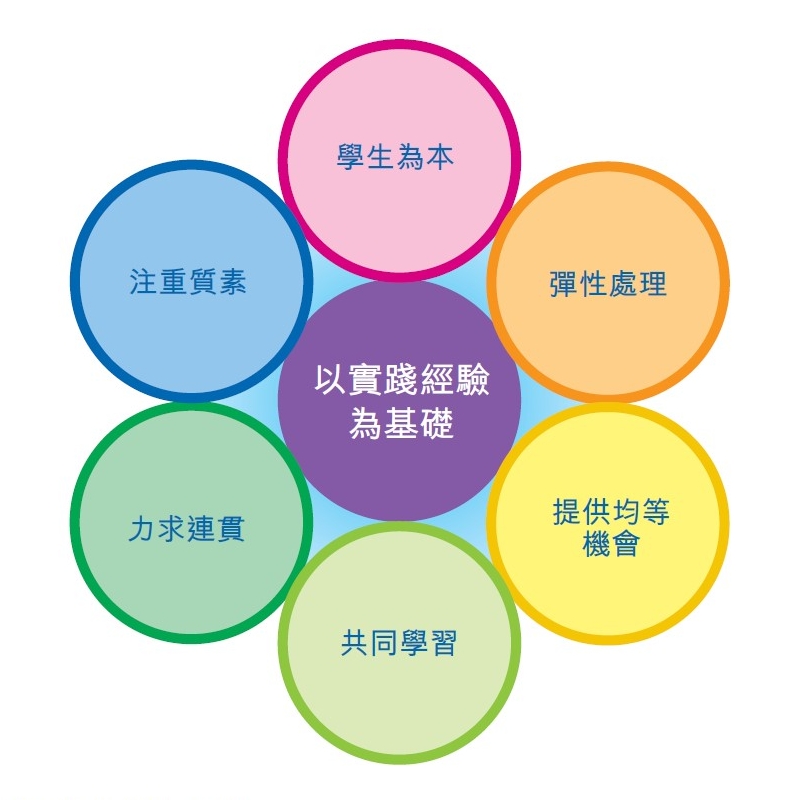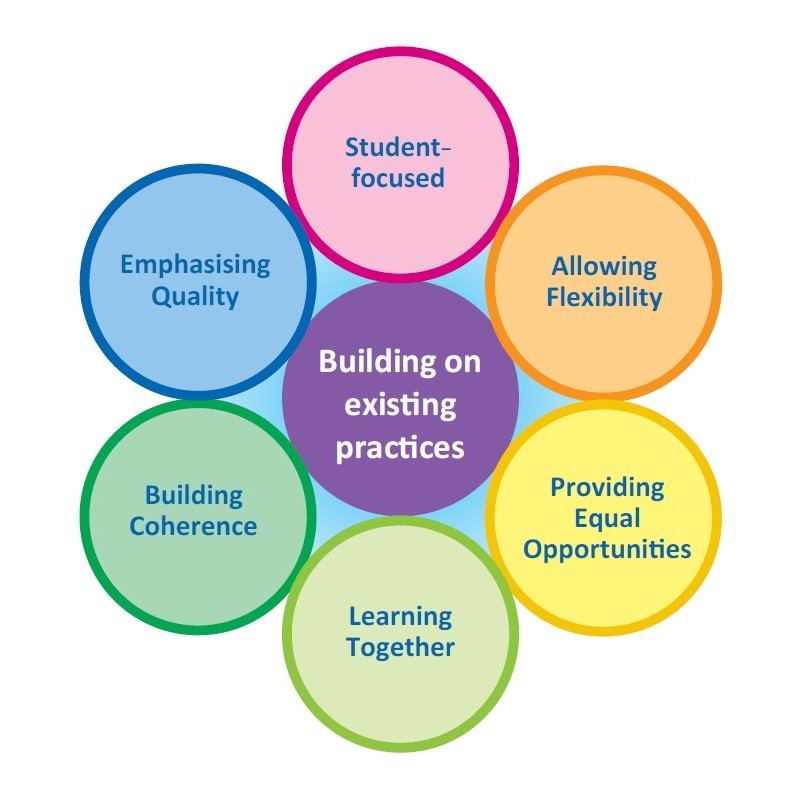








| �@ �X �ھڷs�����ҵ{�A�u��L�Dz߸g���v�O�T�Ӳզ��������@�A�P�֤ߤο���(�]�A���ξDz߽ҵ{)�ۻ��ۦ��A���ǥF�ܥ��H�o�i�C�b��¦�Ш|(�p�@�ܤ��T)�����ذ�n�Dz߸g���ҫإߪ���¦�W�A�Ǯշ|���ǥʹ��Ѧh�ؤ��P���u��L�Dz߸g���v���|�A���y�L�̰ѻP���ӽdå���u��L�Dz߸g���v�A�]�A�w�|�Τ����Ш|�B���|�A���B�P�u�@�������g���B���N�o�i�M��|�o�i�C �̷s�q��ij �H�ۦb2012�~���ӤT�~�s�����ҵ{���оǴ`���έ������䤤�Ǥ�̦Ҹն��Q������A�Ш|���B�ҵ{�o�iij�|�έ���Ҹդε��֧����X�@�A�@�P�i�}�s�Ǩ��˰Q�A���b�˵��F�������榨�G�B��X�u�Ӥ��B�B���\�Ҥl�έ��e���D�ԡA�������u�ƽҵ{�ε����F�����X���꦳�Ī���ij�C�ڭ̦]���˰Q���G�A�N�۽ҵ{�B�����λα��ɾǤδN�~�X�����D�nij�D�A�w��2013�~4�뤽�G�s�����ҵ{�ε������̷s�q��ij�C�����Ա��A�i�s���m�s�Ǩ��˰Q�M���n(http://www.edb.gov.hk/nas/review)�C ���ŦX�ҵ{���DzߥؼСA���ǥʹ��Ѽe�s�Ӧh�����ҵ{�H�P�i�ǥͥ��H�o�i�A�ôL���j�����Ǯժ���ܤήե��o�i�ݭn�A�s�q��ij�u��L�Dz߸g���v�����t�Үɬ��`�Үɪ�10��15%�A���ǥͦb���ӽdå�]��|�o�i�B���N�o�i�B�w�|�Τ����Ш|�B���|�A�ȡB�P�u�@�������g��^���A�~����o���ŵo�i�C �@
�b�s�q�U�A�ڭ̹��y�Ǯ��F���W�e�T�~�������u��L�Dz߸g���v�]�]�A�W�Үɶ����H���ΥH�~���Dz߮ɶ��^�A�M�~�ۥD�A�u�ʳB�z�C�P�ɡA�u��L�Dz߸g���v���@�p�H���A���褣���q�αj�դϫ��A�`�Ƥξd�T�ǥͩҾǡA���i�ר��Dzߪ���O�A�P�i�ǥͥ��H�o�i�C�b����u��L�Dz߸g���v�ɡA�Ǯդ����u�������Үɫ��ު��n�D�A���������Ҽ{�γW�e�����Dz߸g�����Dzߥت��ΩҴ��檺�Dzߦ��G�C �@ |
*��ij�̷s�q���u��L�Dz߸g���v�Үɤ��t�A�аѦҡu�ɶ��w�ƨҤl�v �C
| �@ �X �ذ��{�����u�թM��¦�W�A�Ǯ����J�ӰѦҦU�ءu��L�Dz߸g���v����ij����Ҧ��C�Ҧp�{�ɤj�����Ǯէ������N�o�i����|�o�i���ѩT�w�Ҹ`�A�h���G�̦b�s�����ҵ{��i�z�L���t�Ϊ��Ұ�Dz߱���C�ܩ�w�|�Τ����Ш|�A�@��i�Q�ίZ�D���ҡB���|�B�S�O�w�ƪ��ɬq�Ψ�L�Ұ�H�~�����ر���A�H�إߥ����������[�C�@�dzзs�N���p�ͬ��ޯ�Ш|�B�~��Ш|�B�۲z�P�v�бШ|�i�H�O�w�|�Τ����Ш|���զ������C�p���ݭn�A�P�u�@�������g��Ϊ��|�A�ȥi�w�Ʃ�ҫ�B�Ҹյ�����B�P���ξǮհ����|��C
�X
�ذ��{�����u�թι��G�ڭ̹��y�Ǯճz�L�˵��Χ�u��L�Dz߸g���v�ذ��{�����u�թι��W�A�ç�X�u�����v�M�u�L�h�v�������A�H�@�X���ݭn���վ�A����Ӥ����q�A�קK���s�]�p�Ҧ����ةΡu���F���ܦӧ��ܡv�C �@ |
|
�ؼЩM�w�����G �b����u��L�Dz߸g���v�ɡA�Юv�����`�U�C�ؼФιw�����G�G
�@ |
|
�C���D�ɭ�h �Ǯեi�ھڤU�ϩҥܪ��C���D�ɭ�h��������Dz߭p���C �����Dzߪ��D�ɭ�h��
�@ ��h�@�G�ذ�b�{���������u�դW �q�椧���Ī����g��}�l�A�]���{�����귽�]�Ҧp�M�~���ѡB�ɶ��B�P���c���sô�^�Ө�w�s���p���C�Ǯեi�Բ��˵��{�����ʡA�ѧO�i�@�������Dzߪ����ءC�Ǯե�i���s�վ㵦���覡�A�Ҧp�z�L��Ө�w�s�e�������Dzߦ~�p���A�ӫD�|��ӧO�������Dz߬��ʡC ��h�G�G�ǥͬ��� ���ǥͿn���ѻP�W���β�´�����Dz߬��ʡA��ť�L�̪��N���δ��ɥL�̪��֦��P�C�ۭ��ǥͪ��˨��g���A�H�ΥL�̦p�ƩM�غc�o�Ǹg�����N�q�A�q�ӧ��ܭӤH�����[�M�A�סC ��h�T�G���|���� ����U�إ����Dz߬��ʡA�H���U�ǥͪ����P�ݭn�A�]�A���S���Ш|�ݭn���ǥͪ��ݭn�C�����Dzߨä��O���u�q�ǥͪ����y�A�ӬO���Ҧ��ǥʹ��Ѿ��|�A���L�̥H���P�覡�o�����A������ʧO�B���|�g�٭I���B�Ƿ~���Z���]���v�T�C ��h�|�G�O�D�s�e �T�O�����DzߨëD�Ѥ������������ʲզ��A�ӬO�Ǯվ���ҵ{�W�����i�ίʪ��@�����C��w�A�������浦���A�P���Ϲ���إ߹٦����Y�Υ�y�����A�H�ιB�Ϋ�������F�ܥ����Dzߪ�����o�i�A�o���̰��Dzߦ��ġC ��h���G�`����� �T�O�ǥͱq�����Dzߩұo���g���F�ܹw�����DzߥؼСA�äɾǥʹN�����Dz߹L�{�����g���@�X�ϫ�A�����u��M�ήɪ��^�X�C ��h���G�u�ʳB�z ���ǥʹ��Ѥ@�t�C�����]�Ҧp�ζ���@�B�����Ψ����t�^�A�H�������禡�Dzߪ�����C�B�κ�X�覡�ӳ]�p�[�\���ذ�n�Dz߸g���������Dz߭p���C ��h�C�G�@�P�Dz� ����Dz߫P�i�̪�����A�ΥH�Dzߪ̪������M�ǥͤ@�P�DzߡA�ӫD���ʾɮv�ά��ʴ��Ѫ̡A���ǥʹ��ɾDz߯�O�A�P�i�ۥD�DzߡA�H�Ϋإߧ�K�����v�����Y�C �@ (�ԲӤ��e�A�аѾ\�m���DZШ|�ҵ{���ޡn(2017)�A���U7�J�����Dzߤ����禡�DzߡC) �@ |
| �@ |
| �@ |
| �@ �X Under the NSS Curriculum, OLE is one of the three components that complement the core and elective subjects (including Applied Learning courses) for the whole-person development of students. Building on the foundation of the five Essential Learning Experiences in the Basic Education (Primary 1 - Secondary 3), schools will offer students a range of OLE opportunities encouraging them to participate in the five areas of OLE, namely Moral and Civic Education, Community Service, Career-related Experiences, Aesthetic Development and Physical Development. New Recommendations for Fine-Tuning OLE Further to the implementation of the first 3-year cohort of the New Senior Secondary (NSS) Curriculum and the completion of the first Hong Kong Diploma of Secondary Education (HKDSE) Examination in 2012, the Education Bureau, the Curriculum Development Council (CDC), and the Hong Kong Examinations and Assessment Authority (HKEAA) have jointly conducted the New Academic Structure (NAS) review. The broad objective of the review is to assess the implementation and policy outcomes of the NAS and identify the strengths, good practices as well as the challenges ahead with a view to making effective recommendations for the continual improvement of the NSS curriculum and assessment in future. Based on the result of the review and with reference to the main issues on the curriculum, assessment and articulation pathways for further studies and work, the new recommendations for fine-tuning the NSS curriculum and assessment were delivered in April 2013. For details, please refer to the webpage of the NAS Review (http://www.edb.gov.hk/nas/review/en). In order to achieve the learning objectives of OLE �V providing students with a broad and balanced curriculum with diverse learning experiences to foster whole-person development as well as respect the choice of the majority of schools and their school-based development, the suggested time allocation of OLE is adjusted to 10 to 15% of the total lesson time for the continual enhancement of a balanced development of students through the five areas of OLE (Moral and Civic Education, Community Service, Career-related Experiences, Aesthetic Development and Physical Development).
Under the new recommendation, schools are encouraged to have flexible planning of OLE (including time-tabled and non-time-tabled learning time) for students throughout the three years of the NSS education. Besides, schools can make school-based arrangement upon their professional judgment and flexibility in the time allocation of OLE. All along, it is the quality of OLE that matters, rather than the quantity. Schools should facilitate students to deepen and consolidate their own learning through quality reflection so as to nurture students�� life-long learning capability and foster their whole-person development. In the implementation of OLE, it is always NOT just about satisfying the suggested percentage of time allocation, due consideration should be given to the overall planning on the expected learning objectives and outcomes of the respective learning experiences. �@ |
* Suggested Recommendation for the Fine-tuning of the Time Allocation of OLE, please refer to the ��Time Arrangement Examples��.
| �@ �X Building on the strengths and experiences the school has already had, due consideration should be given to the suggested modes of implementation for each type of OLE. For example, Aesthetic Development and Physical Development could be largely implemented in the form of structured lessons, which are already available in many schools. Moral and Civic Education (MCE) is commonly provided in class teacher periods or the assemblies, specifically assigned lessons and other outside class events to develop positive values. Initiatives such as life-skills education, character education, ethics and religious education could be part of MCE. Career-related Experiences and Community Service could be arranged after school, during post-examination time, weekends or school holidays if required. �X Building on existing strengths/ practices �V Schools are encouraged to review and build OLE into their existing practices and strengths, as well as identifying ��gaps�� and ��over-dos��, and making necessary adjustments accordingly. It is not quantity, but quality that matters. Try to avoid re-inventing the entire programmes or ��change for the sake of change��. �@ |
|
Aims and Expected Outcomes of Other Learning Experiences (OLE) In implementing Other Learning Experiences, teachers need to keep the following aims and expected outcomes in mind:
|
|
Seven
Guiding Principles Schools could implement their LWL programmes in accordance with the seven guiding principles as shown in the following figure. Guiding Principles of Life-wide Learning
Principle 1: Building on Existing Practices Start with an existing practice that works and organise new programmes in accordance with the resources available (e.g. expertise, time and organisational links). Schools may carefully examine their existing school activities and identify some that could become LWL opportunities. Schools may also reengineer the existing system, e.g. constructing a consensual LWL programme of the year instead of organising LWL event by event. Principle 2: Student-focused Engage students actively in planning and organising LWL activities to include their views and enhance their sense of ownership. The focus is on what students�� experience, and how they internalise and make sense of that experience so as to effect a change in personal values and attitudes. Principle 3: Providing Equal Opportunities Implement a diverse range of LWL activities to cater for students' different needs, including those of students with Special Educational Needs (SEN). LWL is not a reward for good students only. It is important to provide opportunities for all students to develop their potential in different ways, regardless of their gender, socio-economic backgrounds, academic achievements, etc Principle 4: Building Coherence Make sure that LWL is not a combination of unconnected activities but an integral part of whole-school curriculum planning. Devise appropriate implementation strategies, establish partnership or networking with community organisations, and use continuous assessment to achieve sustainable development of LWL and maximise learning effectiveness. Principle 5: Emphasising Quality Align the experiences students gain from LWL with the learning targets being pursued. Guide students to reflect on what has occurred in the process of LWL and provide quality and timely feedback. Principle 6: Allowing Flexibility Offer students a range of strategies (e.g. teamwork, simulation and role play) to enhance the quality of experiential learning. Use an integrated approach to designing a LWL programme incorporating the five essential learning experiences. Principle 7: Learning Together Play the role of facilitators or act as learners alongside the students instead of acting as instructors or activity providers to enable students to improve their learning capabilities, promote self-directed learning as well as strengthen teacher-student relationships. �@ (For details, please refer to the Booklet 7: Life-wide Learning and Experiential Learning of the Secondary Education Curriculum Guide (2017)) |

